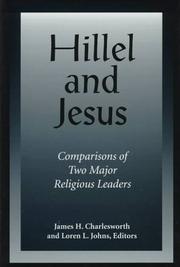| Listing 1 - 3 of 3 |
Sort by
|

ISSN: 0755169X ISBN: 2226110461 9782226110466 Year: 1999 Volume: 24 Publisher: Paris: Albin Michel,
Abstract | Keywords | Export | Availability | Bookmark
 Loading...
Loading...Choose an application
- Reference Manager
- EndNote
- RefWorks (Direct export to RefWorks)
De tous les maîtres cités dans le Talmud, Hillel le Babylonien, qui vécut et enseigna à Jérusalem au temps du roi Hérode, reste sans doute encore aujourd'hui le plus populaire dans la tradition juive. C'est de lui que se réclame la tendance modérée que le Talmud fit prévaloir, c'est à lui que se rattache la lignée des patriarches qui guidèrent le judaïsme jusqu'au Ve siècle. De nombreuses anecdotes soulignent sa personnalité rayonnante et certains des propos qui lui sont attribués préfigurent ceux de Jésus.
Judaism --- Judaïsme --- Hillel, --- Talmud --- Hillel the Elder --- Talmud. --- Hillel l’Ancien --- Hillel

ISBN: 0800625641 Year: 1997 Publisher: Minneapolis, Minn. Fortress
Abstract | Keywords | Export | Availability | Bookmark
 Loading...
Loading...Choose an application
- Reference Manager
- EndNote
- RefWorks (Direct export to RefWorks)
Christianity and other religions --- Judaism --- 225*1 --- 225*1 Leven van Jezus Christus in het Nieuwe Testament. Historische Jezus Christus --- Leven van Jezus Christus in het Nieuwe Testament. Historische Jezus Christus --- Jews --- Religions --- Semites --- Christianity --- Syncretism (Christianity) --- Judaism&delete& --- Congresses --- Relations&delete& --- Christianity&delete& --- Religion --- Relations --- History --- Hillel, --- Jesus Christ --- Christ --- Cristo --- Jezus Chrystus --- Jesus Cristo --- Jesus, --- Christ, Jesus --- Yeh-su --- Masīḥ --- Khristos --- Gesù --- Christo --- Yeshua --- Chrystus --- Gesú Cristo --- Ježíš --- Isa, --- Nabi Isa --- Isa Al-Masih --- Al-Masih, Isa --- Masih, Isa Al --- -Jesus, --- Jesucristo --- Yesu --- Yeh-su Chi-tu --- Iēsous --- Iēsous Christos --- Iēsous, --- Kʻristos --- Hisus Kʻristos --- Christos --- Jesuo --- Yeshuʻa ben Yosef --- Yeshua ben Yoseph --- Iisus --- Iisus Khristos --- Jeschua ben Joseph --- Ieso Kriʻste --- Yesus --- Kristus --- ישו --- ישו הנוצרי --- ישו הנצרי --- ישוע --- ישוע בן יוסף --- المسيح --- مسيح --- يسوع المسيح --- 耶稣 --- 耶稣基督 --- 예수그리스도 --- Jíizis --- Yéshoua --- Iėsu̇s --- Khrist Iėsu̇s --- عيسىٰ --- Congresses. --- Christology --- Hillel the Elder
Book
ISBN: 1400811562 1282751638 9786612751639 1400820804 9781400820801 9781282751637 1400815835 Year: 2021 Publisher: Princeton, NJ
Abstract | Keywords | Export | Availability | Bookmark
 Loading...
Loading...Choose an application
- Reference Manager
- EndNote
- RefWorks (Direct export to RefWorks)
Relations between Jews and non-Jews in the Hellenistic-Roman period were marked by suspicion and hate, maintain most studies of that topic. But if such conjectures are true, asks Louis Feldman, how did Jews succeed in winning so many adherents, whether full-fledged proselytes or "sympathizers" who adopted one or more Jewish practices? Systematically evaluating attitudes toward Jews from the time of Alexander the Great to the fifth century A.D., Feldman finds that Judaism elicited strongly positive and not merely unfavorable responses from the non-Jewish population. Jews were a vigorous presence in the ancient world, and Judaism was strengthened substantially by the development of the Talmud. Although Jews in the Diaspora were deeply Hellenized, those who remained in Israel were able to resist the cultural inroads of Hellenism and even to initiate intellectual counterattacks. Feldman draws on a wide variety of material, from Philo, Josephus, and other Graeco-Jewish writers through the Apocrypha, the Pseudepigrapha, the Church Councils, Church Fathers, and imperial decrees to Talmudic and Midrashic writings and inscriptions and papyri. What emerges is a rich description of a long era to which conceptions of Jewish history as uninterrupted weakness and suffering do not apply.
Philosemitism --- Proselytes and proselyting, Jewish --- Judaism --- Antisemitism --- Jews --- Philo-Semitism --- Philsemitism --- Hebrews --- Israelites --- Jewish people --- Jewry --- Judaic people --- Judaists --- Ethnology --- Religious adherents --- Semites --- History. --- Controversial literature --- History and criticism. --- History --- Public opinion --- Relations. --- Proselytizing --- Convert making --- Proselyting --- Proselytism --- Proselytization --- Persuasion (Psychology) --- Religion --- Conversion --- Missions --- Against Apion. --- American Jews. --- Ancient history. --- Anti-Judaism. --- Antiochus IV Epiphanes. --- Arnobius. --- Ashkelon. --- Avodah Zarah. --- Babylonia. --- Babylonian captivity. --- Bar Kokhba revolt. --- Ben Sira. --- Bible. --- Book of Esther. --- Canaan. --- Christian mortalism. --- Conversion to Judaism. --- Culture of Greece. --- Dead Sea Scrolls. --- Elagabalus. --- Elisha ben Abuyah. --- Epigraphy. --- Essenes. --- Etymology. --- Eupolemus. --- Exegesis. --- Gentile. --- Greek literature. --- Greek mythology. --- Greek name. --- Greeks. --- Hebrew Bible. --- Hebrew language. --- Hebrews. --- Hellenistic period. --- Hellenization. --- Hermetica. --- Herod the Great. --- Herodian. --- Herodians. --- Hillel the Elder. --- Hyrcanus II. --- Israelites. --- Japheth. --- Jason of Cyrene. --- Jerusalem Talmud. --- Jewish diaspora. --- Jewish history. --- Jewish identity. --- Jewish literature. --- Jewish mysticism. --- Jewish name. --- Jewish religious movements. --- Jews. --- Joshua ben Gamla. --- Judah Halevi. --- Judaism. --- Judea (Roman province). --- Kashrut. --- Lactantius. --- Land of Israel. --- Letter of Aristeas. --- Maccabean Revolt. --- Maimonides. --- Mishnah. --- Mithraism. --- Notion (ancient city). --- Oenomaus of Gadara. --- Orthodox Judaism. --- Paganism. --- Pharisees. --- Philistia. --- Philo-Semitism. --- Phoenicia. --- Proselyte. --- Ptolemaic Kingdom. --- Ptolemy II Philadelphus. --- Rabbinic literature. --- Roman Empire. --- Roman Government. --- Sadducees. --- Samaritans. --- Saul Lieberman. --- Second Temple. --- Sicarii. --- Sirach. --- Sotah (Talmud). --- Stephanus of Byzantium. --- Suetonius. --- Syrian Jews. --- Talmudic law. --- Temple in Jerusalem. --- The Jewish War. --- Theophilus of Antioch. --- Theophrastus. --- Tiberias. --- Torah. --- Tosefta. --- Yiddish. --- Yishuv.
| Listing 1 - 3 of 3 |
Sort by
|

 Search
Search Feedback
Feedback About UniCat
About UniCat  Help
Help News
News